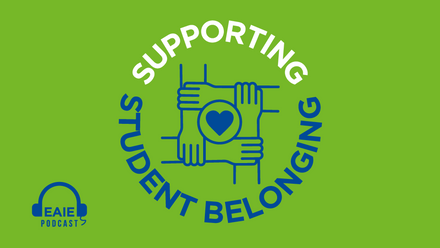Helping students overcome their fear of failure

Higher education professionals are often confronted with students who are so afraid of failing an exam or assignment that, in the end, it may be the fear itself and not the difficulty of the task that prevents the student from achieving his or her academic goals. This blog post aims to help all higher education professionals who have regular contact with students to conceptualise the fear of failure psychologically and will provide some pointers on how best to advise students who suffer from this fear.
Fear of failure: a blurry concept
Unlike a specific phobia (eg fear of heights, fear of spiders), the anxiety around anticipated failure is highly subjective and often vague in nature. Strictly speaking, it is not failure itself that students fear, but certain negative consequences associated with underachieving. Students specifying what they are actually scared of often refer to following consequences:
- Personal: Feeling ashamed about one’s own inability and incompetence, the hurt from having to acknowledge own shortcomings and limitations, feeling guilty and worthless.
- Interpersonal: Disappointing parents, receiving ridicule from classmates, and loosing the professor’s trust and support.
- Career-related: Having decreased chances on the job market and decreased chances to have a decent income and appropriate social status.
Understanding their fear
You can support your students simply by helping them to better understand what they are afraid of. As soon as they become more aware of the ‘fear behind the fear’ and learn to specify their concerns, they can start thinking of ways to cope and overcome their fear.
- If they, for instance, realise that they are too worried about disappointing their parents, peers or professors, they can reflect on solving the underlying issues pertaining to the relationship at stake.
- If it became apparent that they are mainly concerned about career opportunities, you could guide the students by taking a closer look at recruitment criteria and perhaps help them to understand that excellent grades are not the only way to impress potential employers.
- If they come to understand that it is actually more about the unrelenting standards they apply, this could be a starting point for developing a more accepting attitude towards themselves.
Social comparison and reference points
The achievement outcomes which students tend to label as ‘failure’ varies greatly. What might be regarded as a ‘decent result’ by one student could be considered a ‘huge failure’ by another. It is the standards and reference points that students apply in appraising their own performance which determines whether or not students perceive a given result as failure or success. Students who have realistic expectations and the ability to view their current performance in the context of past performances are less prone to experiencing high levels of fear than those who compare themselves with others and who are unaware that even a worse grade achieved in a highly challenging academic context can indicate substantial improvement, if compared with previous achievements gained in a less challenging study environment.
Learn to recognise improvement
Ask your students to compare their current level with their past level of skills and knowledge. Usually, they would agree that it has improved, regardless of their current grades. Tell them that recognising one’s own improvement and not falling into the trap of taking grades as an objective indicator of their competence level is vital to staying motivated and positive. University-level is much more challenging than high school-level education. Expecting to keep one’s excellent grades while competing with classmates who might have stronger backgrounds in certain topics is unrealistic. In other words, encourage the student who has become lost in unhelpful social comparisons to better compare him/herself with him/herself, not with others.
Coping beliefs
Research on self-efficacy expectation shows that individuals, who believe they can bring about desired circumstances out of their own efforts, preventing failure, seem to have higher chances to succeed. Moreover, students feel better prepared and less anxious, if they:
- Regard a difficult task as challenge – and not as threat
- Believe in their capacities to master the challenge
- Focus on the potential gains – not the potential losses – of their endeavours
Another crucial expectation which low-anxiety students tend to have is that they will manage to cope with failure, should it really occur! So instead of trying to prevent something negative from happening, these students can relax and concentrate on their academic pursuits – without the fear of failure.
Preparation helps!
Let the student know, that a very simple way to reduce fear of failure is to put in more effort to feel better prepared. Help the student to find more effective study techniques, for instance by exploring how useful different methods have been so far and suggesting new ones. Help them to remember past successes and review various strategies in coping with negative performance evaluations. By reframing potential failure as an opportunity learn and grow, this can help to bring the student’s fear levels down. In fact, discussing the experience of failure as chance to find alternative sources of self-esteem – not just through performance and achievement – may be the best advice you could give to students who struggle with performance anxiety and self-worth issues! Here are some final thoughts to end on:
- A perfectionist, for example someone who believes he or she must get everything 100% right, will be more afraid of failing than someone who grants him or herself the right to learn and improve.
- Someone who, equates ‘failing a task’ with ‘failing as a person’ will be more fearful than a person with a stable sense of self-worth.
- A person who knows that s/he is okay and worthy as a human being regardless of how much s/he accomplishes in life, will be a more relaxed and less anxious performer in comparison to someone who judges his/her worth by his/her achievements.
By Frank Haber, Psychological Counselor and Interculturalist, Jacobs University Bremen, Germany






